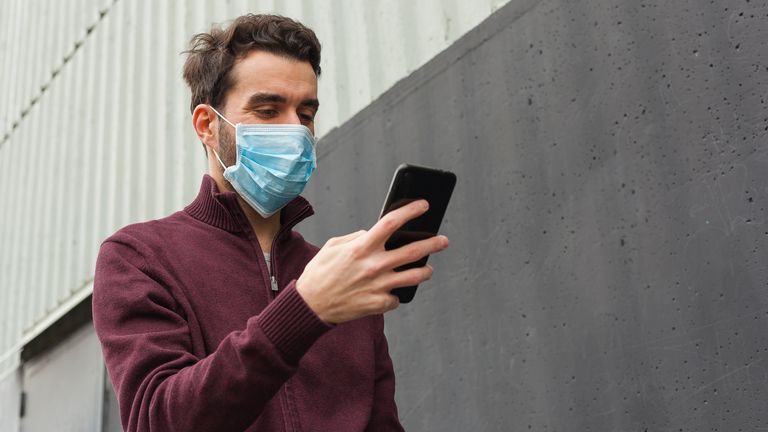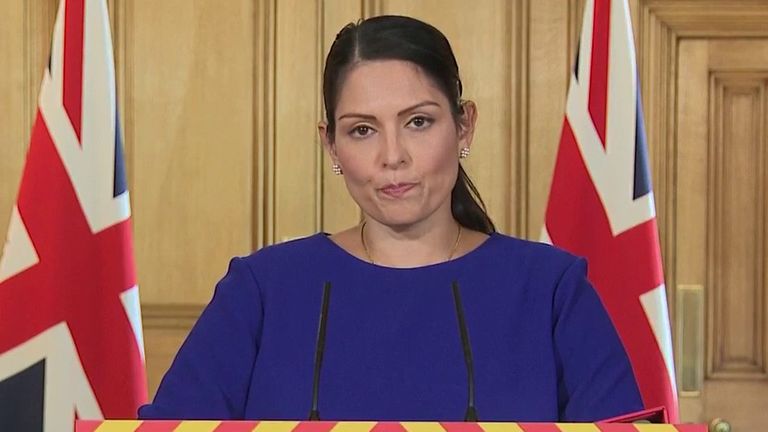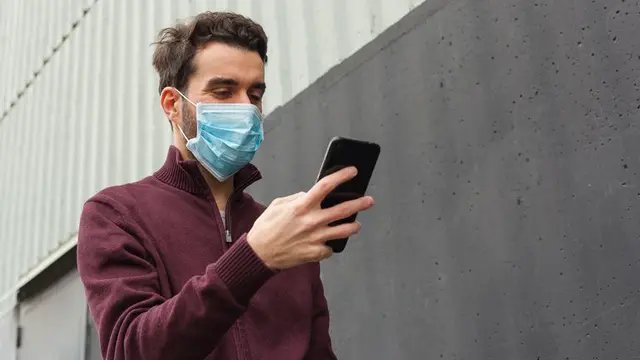More than 370,000 people in the UK have symptomatic COVID-19, according to an app tracking the virus "in real time".
Professor Tim Spector, head of genetic epidemiology at King's College London, said the COVID symptom tracker, which has been downloaded by nearly 2.7 million people, is generating an "unprecedented" amount of data about the disease in the community.
The figures from the app are more than double the 148,377 who have
tested positive
,according to the Department of Health's official numbers.

Image:The COVID symptom tracker is generating an 'unprecedented' amount of data about the disease in the community. File pic
Those behind the tracker app say it is the largest community monitoring of COVID in the world and it could therefore play a key role in helping to ease the
coronavirus
lockdown as well as providing an early warning of **COVID-19
** hotspots and clusters that flare up.
It has also helped identify a number of other common symptoms beyond those singled out by the official list, including the loss of taste and smell and chronic fatigue.
"Many new symptoms that have come to light are not being reflected in the hospital statistics and the death records," Professor Spector said.
"Everyone knows that fever and a persistent cough are known as the classical symptoms - that's what you need to get tested at the moment - but they're only part of the story," he added.
"Perhaps two-thirds of people also have other symptoms which are also highly predictive of having a positive swab test and being infectious and the main one we've seen is actually loss of taste and smell.
"Around 12% of people who are displaying symptoms have this very strange symptom and it comes on very suddenly.
"There's not many other things that cause it and so it's highly predictive that you've been infected and at the moment the official advice is still not to take it that seriously if you don't have a fever.
"Yet many people are in that position - they have mild disease, they've lost their taste and they should really be isolating from other people."
He also said: "Fatigue is another one - so serious fatigue, where you can't get out of bed. You don't have a fever - that's also another indication.
"There's a whole list of these and... you can get different symptoms on different days. We can predict which of those symptoms is likely to lead you to need hospital and which is going to be a mild disease."

'A tragic and terrible milestone' after more than 20,000 deaths
Prof Spector said the app offered "an incredible radar system to protect our country and those that are most in need of it".
He said: "Millions are recording every day what's going on.
"It's giving us unprecedented amount of data - something we really lack in this country about what's going on in the population with this disease, which has many different ways of presenting itself that we haven't known about really before.
"Many new symptoms are coming to light and not being reflected in the hospital statistics and the death records.
"Because we're seeing things at least a week, maybe 12 days before they get into hospital and so we're able to track these trends.
"So, we're able to see in real time what's actually happening around the country, which is extremely important for everybody to know about - both at a local level, but also nationally where we're feeding the data, too."
**:: Listen to the Daily podcast on **
Apple Podcasts
**, Google Podcasts
, Spotify
, Spreaker
**
With data being fed to the authorities across the UK, Prof Spector said: "We are working out ways of predicting where hotspots are going to be, because we think this is going to be really important as it plateaus out and we get, say, below 100,000 cases across the country.
"As lockdown is eased, maybe in some regions more than others, we can start to see how there might be a new collection of symptoms.
"A little spark might occur in some part of the country and we can send out teams to go and investigate them, isolate them and lock them down a week before we would with any other method.
"The more people that use this app round the country, the more we can get everybody on board and so actually be more relaxed about easing some of the lockdown knowing we have got like radar system in place to track it."
He also said it had identified further common symptoms of infection.
 简体中文
简体中文

